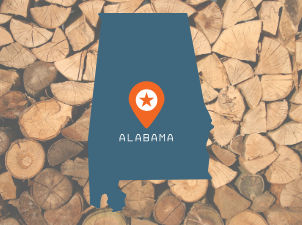
Sweet Home: Finding My Political Independence in the Heart of Dixie
Anne Marie Bonds
February 26, 2020
College football. Amazing, unhealthy food. Devout Christians. Farmers. Home. What do you think of when someone says they’re from Alabama?
When I say I’m from Birmingham, Alabama, people usually react like this: “Ughhhh…Ooofff…I’m sorry…”. This is because there are often some pretty disparaging stereotypes associated with those living in the Heart of Dixie: Trump-supporting, Bible thumping, uneducated, college football-loving rednecks.
In many ways, they can be right. I remember when my brother broke our family’s oven out of rage after Alabama lost the Iron Bowl to Auburn in 2013. I remember catching catfish with just my bare hands in the river by my house as a teenager. I also remember my Dad thanking God for Donald Trump’s election during our Thanksgiving prayer in 2016.
How did I, a self-proclaimed Democrat, working for a social justice organization, come from a state like Alabama?
For a long time, I stayed away from all things political, mainly because I didn’t understand it. When the announcement came over my elementary school speakers that President George W. Bush had been elected for a second term, I cheered along like all the other kids, but I honestly didn’t even know who that was at the time. During the 2008 election, I told my mom I supported Obama, simply because I thought his name was cool.
In reality, I didn’t have to worry about politics because nothing the government changed would affect me and my family. As a white, upper middle-class woman, whose parents both worked secure jobs with benefits, I didn’t have to worry about anything negatively impacting my family. My privilege meant I didn’t have to participate in politics if I didn’t want to. So, I spent most of my teenage years living a blissfully ignorant life: unaware of the vast amounts of poverty, homelessness, and injustice occurring every day in a place I had dubbed the ‘bad side of town.’ My white, suburban bubble was pervasive and opaque. I was blind to the ways that the government and the nation are failing the most impoverished and vulnerable in my community.
For me, that all changed when my father was diagnosed in 2013 with ALS, a terminal neuromuscular disease. ALS is unique in that it doesn’t really discriminate: people from all areas of life have to endure a terminal disease if diagnosed. Throughout my father’s journey with ALS, I learned that although ALS is such a difficult, miserable disease, many of those diagnosed were more stressed by the financial instability the disease caused. Every week, my father and I would meet with others with ALS and their loved ones, and instead of speaking on ALS itself, they spoke of how hard it was to stay afloat financially, while also paying for their desperately needed care. Most of the people would have to decide between paying for their medicine or their caregiver; their wheelchair or their home.
When I looked around at those with ALS in my community and my state, I saw a group of people dealing with a horrible, evil disease. I saw heroes who, even when their body was failing them, continued to work to provide for their families and those they loved. Even as I saw such misfortune and unnecessary evil in the face of ALS, I saw something else much more disheartening. I saw people who had been abandoned. People who had been forgotten, both by their government and their community.
Through this experience working and living with those suffering with ALS, I realized something vital to my political identity: all people, regardless of where they come from, must be considered and respected in the eyes of our government and society. Not just the white, and not just the wealthy. It is easy to disregard this when your interests are being served on Capitol Hill, but, if we are going to call ourselves the greatest country in the world, a true democracy, then no person or group can be abandoned by our government or our people.
So, if you’re reading this and wondering how you can get involved outside of your white, suburban bubble, I challenge you to speak and live with those different from you. People from all genders, ethnicities, socioeconomic statuses, abilities, etc., all have a different perspective to share. Meet with those who have been disenfranchised and invalidated by our government, media, and culture. Realize that they, just like you, are entitled to dignity and worth, and they deserve a seat at the table when policy is being made.







